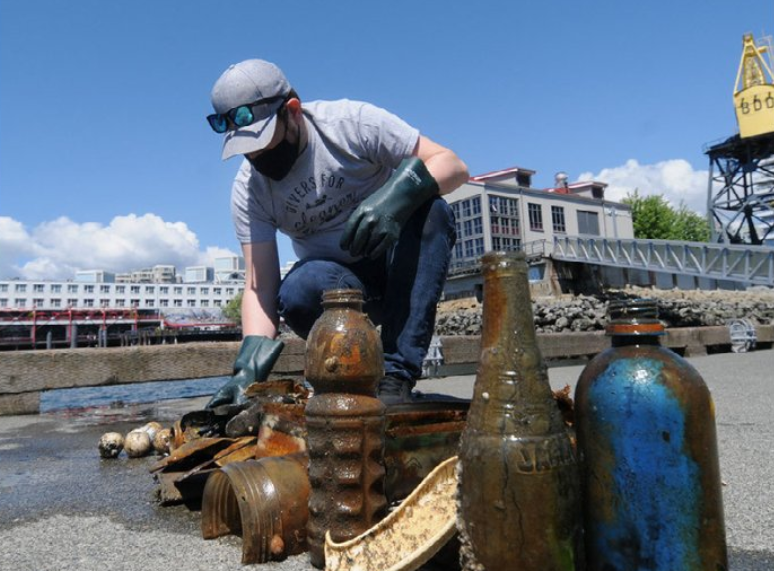When divers dipped below the surface of Burrard Inlet at Lonsdale Quay last week, they were a little surprised by what they found.
For the first time on May 13, volunteers from Divers for Cleaner Lakes and Oceans geared up and explored the waters around St. Roch Dock, the smaller dock near Burrard Dry Dock, to see what might be resting on the ocean floor.
The team of divers has become known as the guardian angels of B.C.’s popular lakes and beaches, spending their free time underwater collecting everyone else’s forgotten garbage.
Henry Wang, from Lynn Valley, who is one of the divers who inspired the organization, said the team always liked to choose heavily trafficked locations to clean up, and not having been below the dock before decided to check it out after gaining access approval from the City of North Vancouver.
It turned out to be a “successful day” with the team scooping up 63.5 kilograms (140 pounds) of trash. On a more positive note, Wang said the amount of garbage collected was a lot less than he expected and different from what he usually hauls in from party lake destinations.
“I was expecting beer bottles or beer cans, but we didn’t get any of those,” he said, adding there were a few other types of plastic and glass bottles but nothing like what was found at party lakes.
The team also discovered other random items, including an old fire extinguisher, a laptop and hard drive, a crab trap, safety cones, and a shopping cart.
“We found a bunch of things that people have thrown in over the years,” Wang said. “But there was actually a lot of industrial garbage and things that have been there for a very long time. So long that some of the industrial garbage has become habitat for marine life. So, we can't really take those out because there are now living things living in it and growing on it."
He said it was a fascinating experience, as it wasn’t a normal site to dive due to difficult access and safety reasons, but their team had a lot of protocols in place to make it possible.
“The amount of marine life down there was amazing. I've never seen anything like it here locally," Wang said.
On the day, the team was only able to clean up one side of the dock, but Wang said they’d identified garbage on the other side so they’d eventually return and explore more of the area, including checking what was below the Lonsdale Q sign.
Stephanie Smiley, City of North Vancouver acting communications manager, said this was the first time the city has hosted an ocean cleanup like this, but they did regularly partner with the Great Canadian Shoreline Cleanup for events.
“We were thrilled to welcome Divers for Cleaner Lakes and Oceans to St. Roch Dock,” she said.
“With so many waterways throughout the city, there are many opportunities for garbage and contaminants to make their way into these sensitive areas. It’s up to all of us to do our part to protect our waterways and to be stewards of our natural environment."
Last week volunteer Divers for Cleaner Lakes and Oceans completed an underwater shoreline clean up at The Shipyards. Kudos for all their hard work – they collected almost 140 lbs of waste from the inlet floor! pic.twitter.com/lsTt0O6M2p
— City of North Vancouver (@CityOfNorthVan) May 19, 2021
The team has around 28 dive areas, lakes and ocean spots, on their regular cleanup circuit, but are always happy to take suggestions.
On the North Shore, the group also cleans up Rice Lake and Deep Cove annually, but Wang said the areas were pretty tame when it came to the amounts of garbage found, in comparison to Cat Lake in Squamish and Cultus Lake in the Fraser Valley – notoriously known for summer parties.
Wang said the organization started simply by chance back in 2013 when he and his friend Jonathan Martin went for a dive at Buntzen Lake in Anmore and discovered a tremendous amount of garbage resting at the bottom of the lake that they simply “wanted to pick up.”
It was quite the mission for just the duo to clean the lake, and they returned with a few more divers to help them out, eventually hauling out more than 771 kg (1,700 pounds) of garbage from the one lake.
Conquering Buntzen Lake sparked the inspiration to clean up other lakes, and the organization grew from there.
Over the past eight years, they’ve done 133 cleanup dives and collected a whopping 16,329.3 kg (36,000 pounds) of garbage.
To this day, Wang said it still boggles his mind that people don’t always follow the pack it in pack it out rule while enjoying the province’s beautiful lakes and beaches.
“The interesting thing about the trash that's in the lakes is that it's literally out of sight, out of mind,” Wang said. “So, I think the people who do litter, don't think anything of it, because it disappears. But when I dive down, I see all the stuff that people discarded. When I bring it up, people are horrified because it's not something that they were aware of.”
He said the hope was that through their cleanup efforts they could help raise awareness of the problem and try to educate people to do the right thing next time.
The avid diver said while it was overwhelming to think about the amount of garbage floating in ocean patches, he was happy he could do his part to keep the environment clean.
“When I go for a dive in a lake and see a little bit of trash, it pales in comparison to what’s out there,” he said.
“But I can do something about this because it’s right in front of me.”Elisia Seeber is the North Shore News’ Indigenous and civic affairs reporter. This reporting beat is made possible by the Local Journalism Initiative.



